|
|
|
Sort Order |
|
|
|
Items / Page
|
|
|
|
|
|
|
| Srl | Item |
| 1 |
ID:
124869


|
|
|
|
|
| Publication |
2013.
|
| Summary/Abstract |
The wide-ranging varieties of capitalism literature rests on a particular conception of banks and banking that, the authors argue, no longer reflects the reality of modern financial systems. They take advantage of the greater information regarding bank activities revealed by the financial crisis to consider the reality, across eight of the world's largest developed economies, of the financial power of banks to act as bulwarks against market forces. This article offers a marketbased banking framework that transcends the bank-based/capital market-based dichotomy that dominates comparative political economy's consideration of financial systems and argues that future cpe research should focus on the activities of banks. By demonstrating how market-based banking increases market influences on the supply of credit, the authors highlight an underappreciated source of financial market pressure on nonfinancial companies (nfc s) that can have a potential impact across the range of issues that the varieties of capitalism (VoC) literature has seen as differentiating national systems. This approach has implications in areas such as labor, welfare, innovation, and flexibility.
|
|
|
|
|
|
|
|
|
|
|
|
|
|
|
|
| 2 |
ID:
096166
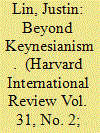

|
|
|
| 3 |
ID:
187889
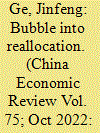

|
|
|
|
|
| Summary/Abstract |
This paper develops a theoretical framework to shed lights on the relations between the segmented financial market and the housing bubble in China. In our framework, capital misallocation across firms plays a central role. The segmented financial market causes discrimination against private enterprises and favoritism to state-owned firms. This biased financial system not only gives rise to capital misallocation across firms but also significantly pushes down the equilibrium interest rate in the formal financial market. The overly low interest rate in the formal financial market causes a rational bubble in a dynamically efficient economy. More importantly, the bubble improves capital allocation across firms by crowding out inefficient investment in the state-owned sector. Despite the role of improving capital allocation, bubbles may still reduce welfare by crowding out aggregate capital.
|
|
|
|
|
|
|
|
|
|
|
|
|
|
|
|
| 4 |
ID:
119885
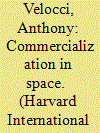

|
|
|
| 5 |
ID:
137705
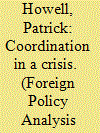

|
|
|
|
|
| Summary/Abstract |
This article explores possible theories of international economic policy coordination, and then proceeds to test these theories through a qualitative analysis of four EU member states – Germany, France, Belgium, and the Netherlands – and their preferences and experiences during the financial market crisis period of Fall/Winter 2008–2009. Both institutional and basic realist theories for coordination preferences are evaluated for explanatory power against the case of the 2008 financial crisis and are found lacking. Instead, this analysis finds that a comparative foreign policy theory of political constraints – institutional design, political polarization, and leader time horizons – emerges as the best fit for explaining the divergence in foreign policies among these EU member states.
|
|
|
|
|
|
|
|
|
|
|
|
|
|
|
|
| 6 |
ID:
121777


|
|
|
|
|
| Publication |
2013.
|
| Summary/Abstract |
The power, vulnerability and destructiveness of financial markets are out of control in South Africa, now among the most unequal, economically volatile and protest-intensive countries worldwide. While debt made itself felt in many sites, of interest in both criticising and promoting solutions is the 'scale jumping' required from South Africa's national insertion into the world financial system, entailing the Reserve Bank setting very high interest rates, in turn leading to unpayable levels of consumer debt, and at a time when microfinance is suddenly discredited as a development strategy. Macro- and micro-financial problems fused in the course of the Marikana Massacre of August 2012, reflecting the local and global powers of the Moody's rating agency and 'mashonisa' loan sharks. The over-indebted Marikana mineworkers, who led a strike which catalysed many wildcat strikes elsewhere, confronted the local crisis by displacing it into the national economy. This only heightened the contradictions that Moody's punished with its September 2012 credit-rating downgrade. Without a genuine 'debt relief' solution at both scales, society will continue to unravel, as financialisation reaches its limits within one of the world's most extreme cases of uneven and combined development.
|
|
|
|
|
|
|
|
|
|
|
|
|
|
|
|
| 7 |
ID:
189403


|
|
|
|
|
| Summary/Abstract |
The purpose of this paper is to shed light on the impact of the rising terrorist threat on the performance of a small capitalization market – the Tunisian stock market-. Using an event study methodology as well as conditional volatility, we investigate the impact of recent terrorist attacks in Tunisia on the general index TUNINDEX and sector indices. Our main findings are as follows. First, we find that terrorist attacks negatively affect the Tunisian stock market. However, the decline – considerable in certain cases- is short-lived: the market recovers from terrorist shocks in one day. Second, Oil and Gas, Insurance and Telecommunications, are the most affected sectors. Third, different terrorist tactics have varied effects on the stock market that leads us to conclude that attack type, weapon type, target type, and severity of the attack may determine the market’s reactions.
|
|
|
|
|
|
|
|
|
|
|
|
|
|
|
|
| 8 |
ID:
095022


|
|
|
|
|
| Publication |
2010.
|
| Summary/Abstract |
The results of deliberations in multilateral fora are often considered ineffective. Decision making in the European Union (EU) and in particular its key intergovernmental body, the European Council, poses no exception. Especially in the domain of EU foreign and security affairs, the unanimity requirement governing this institution allegedly allows nationalist governments to torpedo any attempt to build up a credible European defense force and a unified foreign policy stance. In this article, we take issue with the claim that multilateral summits merely result in "hot air" by looking at whether and how decisions made during EU summit meetings affect the European defense industry. We argue that investors react positively to a successful strengthening of Europe's military component-a vital part of the intensified cooperation within the European Security and Defense Policy (ESDP)-since such decisions increase the demand for military products and raise the expected profits in the European defense industry. Our findings lend empirical support to the view that financial markets indeed evaluate the substance of European Council meetings and react positively to those summit decisions that consolidate EU military capabilities and the ESDP. Each of the substantial council decisions studied increased the value of the European defense sector by about 4 billion euros on average. This shows that multilateral decisions can have considerable economic and financial repercussions.
|
|
|
|
|
|
|
|
|
|
|
|
|
|
|
|
| 9 |
ID:
154539


|
|
|
|
|
| Summary/Abstract |
Myanmar's trade deficit has widened dramatically in the past few years. One of the reasons lies in the lack of trade finance for exporters and certain financial sector shortcomings more generally. This policy note introduces the idea of establishing a public Export Credit Guarantee Scheme (ECGS) and explores if and how this policy measure could support the rebalancing of Myanmar's trade deficit. Such a scheme could help relieve export constraints by: first, facilitating access to credit for exporters by mitigating risk and increasing banks' willingness to lend; second, helping exporters to offer better payment terms to importers; and third, contributing to enhance confidence in Myanmar entities (both banks and enterprises) among foreign entities. Looking at the experience of other countries, the policy note also points to a number of guiding principles that policymakers should consider when pondering the idea of setting up an ECGS. Moreover, it highlights that certain challenges have to be expected. First and foremost, given the low level of financial sector development and limited existing knowledge on trade finance, it is questionable whether the necessary skills and capacities to properly operate such a scheme are available in Myanmar. Seeking international support can help to address this issue. A practical way forward might be to pilot an ECGS with a rather small portfolio of products that targets one or a few sectors to test the ground while limiting the public resources at risk.
|
|
|
|
|
|
|
|
|
|
|
|
|
|
|
|
| 10 |
ID:
114390
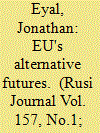

|
|
|
|
|
| Publication |
2012.
|
| Summary/Abstract |
Europe's economic and political system is broken, and this reality will stay with us for the foreseeable future. Anyone wishing to understand the coming challenges of defence and security policy must appreciate that the implications of the European crisis will reach far beyond the financial markets. Jonathan Eyal takes a closer look at the faultlines on which today's Europe is resting, and points out the ways in which economic and political instability could spill over into the security realm.
|
|
|
|
|
|
|
|
|
|
|
|
|
|
|
|
| 11 |
ID:
126185
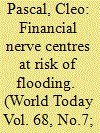

|
|
|
|
|
| Publication |
2012-13.
|
| Summary/Abstract |
Cleo Paskal on the threat nature poses to world markets
|
|
|
|
|
|
|
|
|
|
|
|
|
|
|
|
| 12 |
ID:
130053
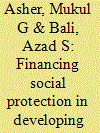

|
|
|
|
|
| Publication |
2014.
|
| Summary/Abstract |
Demographic trends portend the rapid ageing of Developing Asia (DA), albeit at varying rates. This phenomenon, along with the need to extend coverage of social protection systems is likely to increase public and private expenditure on social protection, particularly for pensions and healthcare. This paper analyses the options for additional financing of social protection in DA. As total national and fiscal resources devoted to social protection increase, an important issue will be how the additional burden is shared between different sectors, and financing instruments. The paper, however, focuses on options to finance additional social protection expenditure. Three broad options are suggested: first, realizing efficiency gains in managing provident and pension fund organizations; second, design and service delivery innovations including better policy coordination and coherence within and amongst healthcare and pension programmes; third, developing capabilities to obtain resources from conventional and unconventional sources of budgetary revenue. The paper also stresses that complementary reforms in fiscal, labour market, financial and capital markets will be needed to manage rapid ageing in DA, and therefore the issue of ageing should be viewed as involving several economic and social arrangements, and not in isolation.
|
|
|
|
|
|
|
|
|
|
|
|
|
|
|
|
| 13 |
ID:
116144
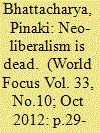

|
|
|
| 14 |
ID:
122463
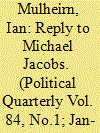

|
|
|
| 15 |
ID:
103784
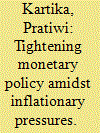

|
|
|
| 16 |
ID:
123150


|
|
|
| 17 |
ID:
124428
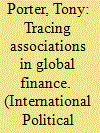

|
|
|
|
|
| Publication |
2013.
|
| Summary/Abstract |
Four decades ago, when financial globalization was attracting widespread attention, the few theoretical frameworks that were available to analyze it were relatively simplistic. Often, it was seen as an unstoppable quasi-natural expression of the expansion of market forces, operating independently of state power, which it was undermining. Today there is a rich variety of frameworks which help us understand the immensely complex entanglements of power, states, markets, and international institutions that constitute and govern global finance, including some insightful uses of actor-network theory (ANT) (for instance, Langley 2006; Best forthcoming 2013). In this contribution I highlight a number of unique contributions that ANT makes to our understanding of global finance.
|
|
|
|
|
|
|
|
|
|
|
|
|
|
|
|
| 18 |
ID:
122518
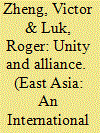

|
|
|
|
|
| Publication |
2013.
|
| Summary/Abstract |
Greater China has been separated and divided for over a century. The reunification of Hong Kong and Macao on the eve of the New Millennium has paved the way for Greater China to reunify as a single economy with a single internationalized currency. History shows that financial and monetary collaborations are essential to the future of Greater China in the global arena. We argue that collaboration might begin with a common board in Hong Kong, Shanghai and Taipei for Greater China enterprises to list and trade in one synchronized market. The common board would also facilitate public and private bonds in support of the infrastructural development and globalization of Greater China enterprises. Due to its established financial market, system and culture, Hong Kong would be the undisputed home of the Greater China Enterprises Board. Financial collaboration would advocate monetary alliance when the Chinese renminbi is fully convertible. When the time comes, the offshore renminbi based in Hong Kong would become the counterpart of the Eurodollar in London. The Asianyuan, as it might be called, would be the truly internationalized and globalized renminbi.
|
|
|
|
|
|
|
|
|
|
|
|
|
|
|
|
| 19 |
ID:
088101


|
|
|
|
|
| Publication |
2009.
|
| Summary/Abstract |
This article develops a twofold critique: on the one hand it addresses those accounts commonly associated with the Varieties of Capitalism literature and their associated understanding of neo-liberalism to argue that there is a dominant tendency to collapse into a binary analysis that asserts either we are witnessing convergence or we are experiencing path dependency. On the other hand it addresses 'neo-Gramscian' accounts which tend to overemphasise processes of transnational convergence and the emergence of a transnational capitalist class at the expense of the embeddedness of capital in national-domestic contexts. On this basis, it is argued that several contributions within political geography pose meaningful questions about the premise that neo-liberalism is inherently variegated. Principally, this involves developing the notion of variegated neo-liberalism to analyse the dynamics of a contingent neo-liberal consensus between transnationally-oriented fractions that both drives EU reform in a neo-liberal direction and reinforces domestic linkages organic to the national context. As a result, the article suggests we therefore reject the notion of a transnational capitalist class somehow detached from the national.
|
|
|
|
|
|
|
|
|
|
|
|
|
|
|
|
|
|
|
|
|